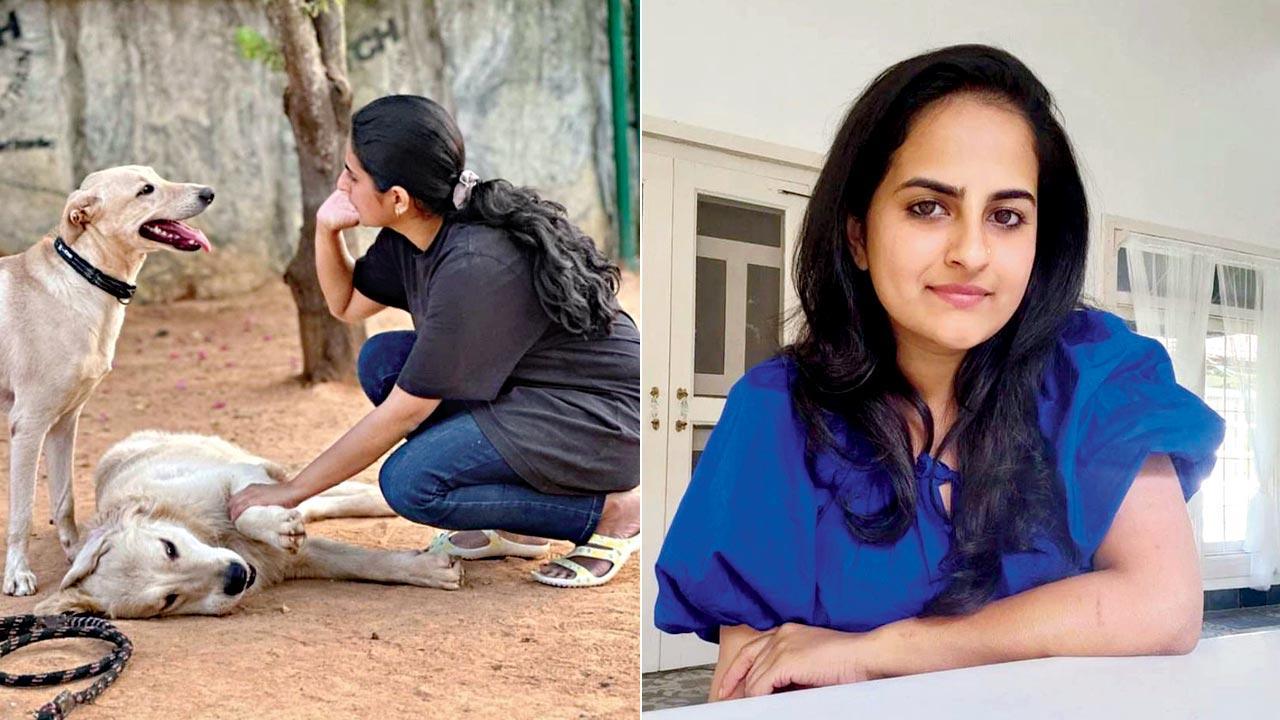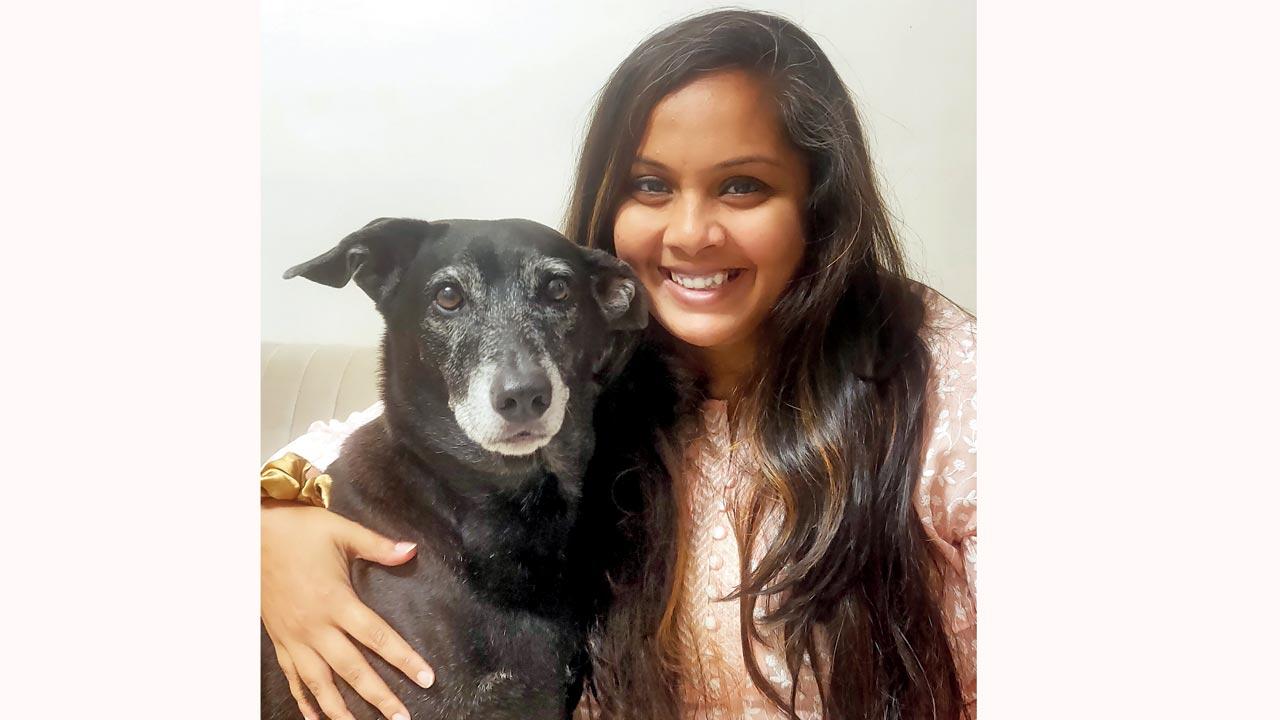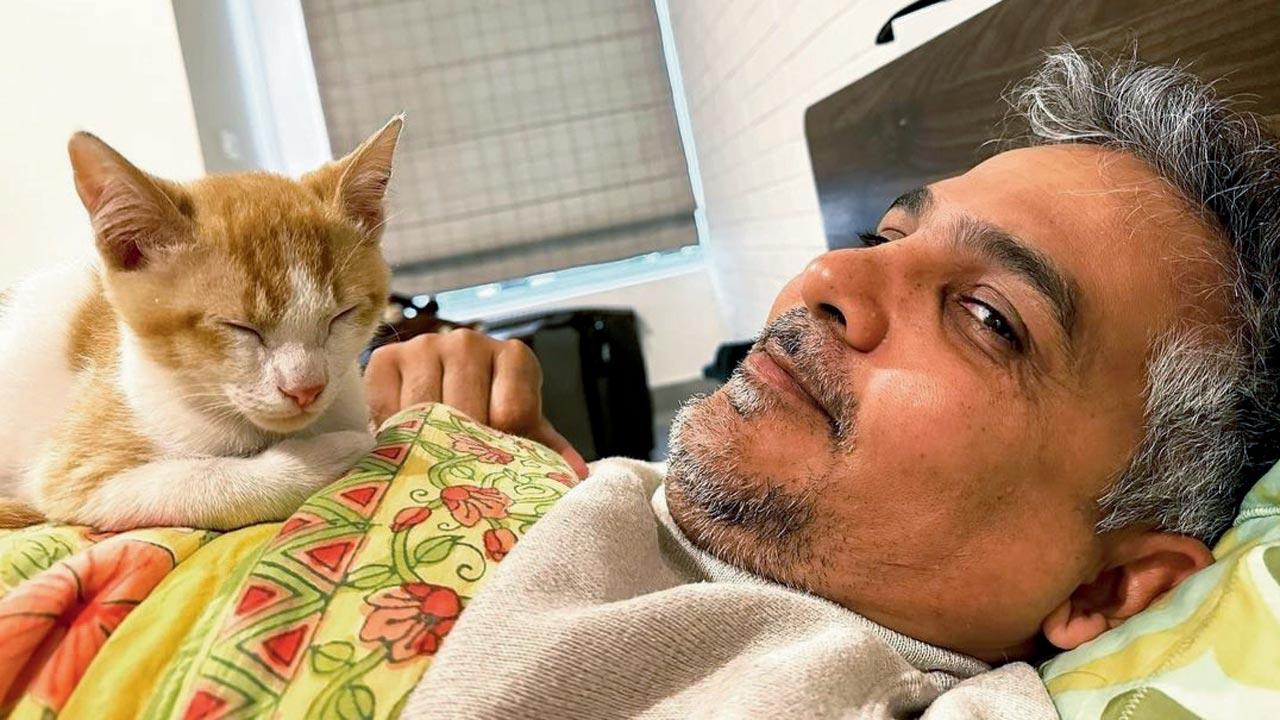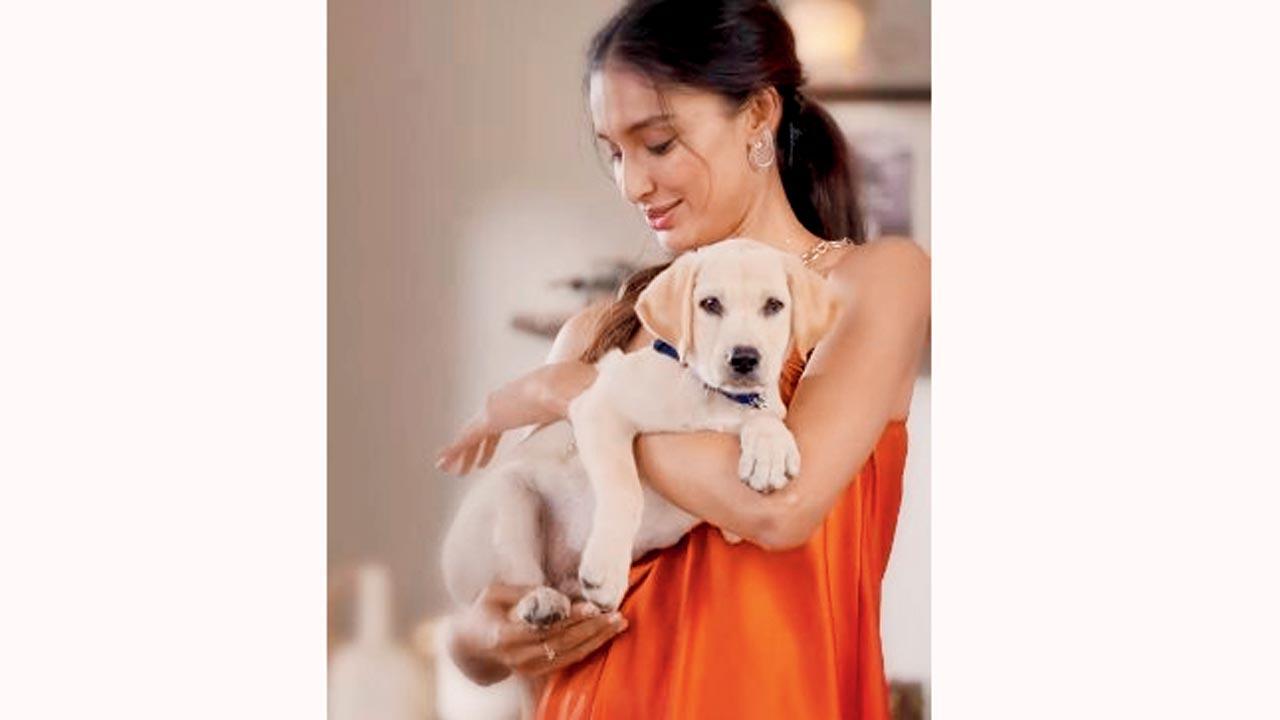As brands and employers recognise how important pets are to their humans, Sunday mid-day wonders what dogs and cats have to say about this

Nandhitha Hariharan lets her dogs Rolex and Anbu initiate physical contact with her; (right) Nandhitha Hariharan
One of the latest Tanishq ads doesn’t show a bedecked bride flanked by her parents, or a sassy young woman buying her own diamonds: It’s a young woman with a yellow Labrador puppy, wearing swinging earrings and a bracelet to “celebrate parenthood of a different kind”.
ADVERTISEMENT
Firstly, one wouldn’t wear jewellery around a puppy, at risk of tearing an earlobe; Secondly, the ad is an important indicator of the changing urban family structure. On April 11, National Pet Day, food delivery app Swiggy unrolled its Pawternity Leave Policy for employees that allows them days off to tend to sick pets, adoption leave to bring it home, and even bereavement leave. Rohit Kapoor, CEO of Swiggy Food Marketplace, is as tunnel-visioned about his pet cats and dogs as any other pet parent, as evidenced from his Instagram feed—it has either posts about his brand or his pets. No wonder then, that Swiggy ostensibly, became the first Indian company to announce pet-friendly policies, which have been met with a mixed response.
 Former advertising professional Shweta Mallapur sought out a mental health professional when she realised her anxiety was making Bruno reactive
Former advertising professional Shweta Mallapur sought out a mental health professional when she realised her anxiety was making Bruno reactive
In 2022, mattress maker Duroflex showed a cat trying to find the perfect place to sleep soundly, while a dog narrated this quest. The scene would resonate with many Indians: The 2023 Dyson Global Dust Study found that almost six in 10 Indians now have a pet, with dogs in the lead. In 2021, an estimated 28 million dogs lived as companion animals, and three million cats performed the role, albeit reluctantly, in the country. That animals spend much time finding the best place to sleep, and spend about 12 to 14 hours resting, would be familiar to consumers.
“Pawternity leave for adopting a pet and the flexibility to work from home while the pet is getting used to its new environment,” is what Swiggy’s new policy entails, said a spokesperson. “Employees will receive an additional paid day off to welcome new pets home. They may also opt for work-from-home during the settlement period. Pet parents can utilise casual or sick leave to attend to the needs of their pets, including veterinarian visits for regular vaccinations. Swiggy’s bereavement leave will now cover pets.”
 Swiggy now offers an additional day off to those bringing home a pet, and includes their welfare in the sick and bereavement leaves. CEO Rohit Kapoor with his pets
Swiggy now offers an additional day off to those bringing home a pet, and includes their welfare in the sick and bereavement leaves. CEO Rohit Kapoor with his pets
The spokesperson’s response to the inhouse communication that led to this decision, is: “We’ve always been committed to fostering a culture of inclusivity and support. We understand that parenthood comes in various forms.” If one needed more proof that pets are inextricably becoming child substitutes to many Gen X-ers, Millennial and Gen Zs, and thus, a reliable stimulus to buy things, one just had to pay attention to Mercedes-Benz’s April Fool gag this year. It unveiled Bark Assist, a voice assistant designed specifically for dogs that deciphered dog barks and allowed pooches to operate vehicle functions such as choosing music, the tilt of the seat, air conditioning and shopping assistant. “The Bark Assist showcases Mercedes-Benz’s commitment to innovation and inclusivity for all passengers, regardless of species,” the company said. Not a totally unbelievable feature given how pet parents assess car size, floor clearance, availability of rear AC and carriage height in connection to their pet while buying a car.
Adorable as it may seem, it is a little worrying whether the growing trend to use pets as substitutes for necessary human connections to peers, children and romantic partners is actually laudatory. Consider this: As much as we love them, animals are kept as pets against their will. They have very little say in what would be human fundamental rights: Where they live, with whom, what to eat, timing of toilet breaks, where to walk and when they get time off from being partner, peer, child, everything to their human.
 Tanishq’s ad for diamonds celebrated the rising family-structure that puts pets at its centre
Tanishq’s ad for diamonds celebrated the rising family-structure that puts pets at its centre
Every day, canine and feline behaviorists consult depressed, reactive, nervous, obese, shut-down pets who manifest these behaviours as a direct burden of the relentless roles thrust upon them. A simple example: An Indie dog—a breed that sees hugging and kissing as threats—being pulled out from under the sofa where he is taking refuge to be squished because the human needs it. If the dog is already under-confident, s/he’ll never really relax and finally resort to snapping at their human to be left alone.
On a more life-threatening end of the spectrum, a cat or dog living in a querulous home could develop chronic skin issues as result of a perennially stressed nervous system; or obesity (and related life-style diseases of joint-pain, compromised cardiac health) if the love-language is hand [read: force]-feeding or fatty human foods.
“While we hear much about the positive implications of living with companion animals, there is much more to reflect on in terms of well-being of both the human and the non-human,” says Raj Mariwala, Director at Mariwala Health Initiative and a certified canine and feline behaviourist. “If a person’s sense of self is deeply linked to their pet’s presence, such emotional fusion can be problematic in the long term for both species.” Especially if a companion animal is the principal or only attachment or emotionally stabilising factor for an individual living alone, something on the rise as more people live away from families, and get a pet. “This is directly connected to the likelihood of having low human social support. Or using the human-animal bond as a compensatory strategy for establishing relationships with other humans,” she says.
Case in point, Shweta Mallapur and her nine-year-old indie Bruno. “I battled anxiety, borderline depression, and zero self-worth for more than a decade.” says the now 35-year-old. “I had no idea I suffered from all of the above until I adopted Bruno in 2014; He would shiver and hide during fights or every time I was angry or my tone rose. At the same time, I was his primary caretaker, and eventually he started mirroring my emotions.” The days Mallapur was suicidal, Bruno would lunge at people; he was uncomfortable around men, just as Mallapur was; he would be restless on nights she couldn’t sleep. Like us, dogs store trauma at the cellular level and the nervous system, and Bruno’s couldn’t regulate itself.
“I saw him turning into an extremely fearful dog with reactivity issues,” she says. “I have a background in psychology, and realised he was severely impacted by my mental health. I needed to seek help or we both would die.” She enrolled with a therapist, studied to become a dog trainer, and got married to her childhood friend in 2021. “My mental health began improving. I learnt emotional regulation, and worked on Bruno,” she says. “Together, we have overcome most of our fears. He is more confident today and reactivity has gone down immensely.”
In philosophy circles, there is a term coined by Jessica du Toit, a doctoral student at Western University in Canada, called Dependency Objection. It questions the right to own a living being of another species. “Calling an animal, a ‘pet’, has come to suggest ownership of the relevant animal, and this idea of ownership may well foster inappropriate attitudes to toward the animal,” says her paper published by the Rotman’s Institute of Philosophy. “…In the same way that to place a human being in the category of property is to impugn the moral status or intrinsic value of that human being, so is to place a ‘pet’ in this category [rephrased]”.
The paper details the debate to bring an end to the practice of companion animals by breeding more, and just caring for those left. It says [rephrased for brevity]: Is it morally permissible to bring companion animals into existence merely to keep them, even if we do not own them? According to [American academic] Gary Francione, “…humans would have a moral obligation to continue to care for those companion animals who already exist. Further, we would also be obliged to ensure that no more of these animals were brought into existence. …In Francione’s view, the inherent wrongfulness has to do with the fact that companion animals are domesticated. Domesticated animals are much more docile and trusting, while this renders them better suited to living with, or in close proximity to humans, it also renders them almost entirely dependent on humans for the satisfaction of their fundamental needs and desires. To be so dependent on another is to be in a position of extreme vulnerability. And to find oneself in this position is to run a very high risk of leading a short and miserable life. For this reason, it is morally indefensible to place or allow another creature to be placed in such a position, and thus we ought not breed companion animals or even allow them to reproduce with one another.”
Mental health professional and dog mom, Meenakshi Bhanj Deo adds science to this forced, and involuntary, co-dependecy, “The human species, has a developed cerebral cortex which gives us language and symbolic ability—the concept of the self and the other. It gives the ability to analyse, think about the past, the future, plan and self-esteem. Animals don’t have this; they relate themselves to you—that’s their truth. You could lock them up for six hours alone, and they will still greet you with joy.”
And more families and individuals become pet-centric, because they get so much love from their pet, their expectation from humans are of the same level, which is unrealistic. Human relationships need conversation, forced amnesia, letting go and conscious choice to do better.
“As marriages are delayed or people stay alone, and they don’t have children or have them later, dogs fill this void of a companion,” says Bhanj Deo, “Expectation from the animal increases, they are seen as the solution to all [human emotional] problems. There is a rise in anthropomorphism; pets are not treated as dogs or cats. They may not be taken out for walks for fear of getting dirty or taken into nature, or overly cushioned for fear of accidents and illness.”
A common belief among pet parents is that toy breeds such as Shih Tsus, Maltese, Minipoos and Lhasa Apsos don’t need walks or time in nature. Treasured for their looks, any activity that gets their coat dirty, is avoided. “People then show love towards their pets with things humans want—spas, bows, clothes to make them look beautiful, accessories such as beds,” adds Bhanj Deo, “when dogs don’t have body image. Their species-specific needs are not met and manifest in the pet’s behavior as aggression and anxiety.”
As a canine behaviourist herself, she comes across dogs that are averse to touch because they are touched a lot by their humans who are directing the physical contact they yearn with a child or companion.
Writer Nandhitha Hariharan, based in Bengaluru, confesses: “I got my first dogs [Rolex and Anbu] as an adult, and they became my entire world. I started to very quickly realise that I was starting to put a dependency on them in things like feeling a little upset when they were sleeping. My bond with my dogs is best on walks… slowly sniffing things. They are doing what they love best. Whenever I’m being intrusive, treating them like a child, not respecting their boundaries, our bond gets affected and they also start to withdraw themselves. I let them initiate physical contact.”
This writer is an obsessive single mother to three animals, and a pet professional. And the simple pact she has made with herself now is to let her cats and dog initiate physical affection and not force it on them.
 Subscribe today by clicking the link and stay updated with the latest news!" Click here!
Subscribe today by clicking the link and stay updated with the latest news!" Click here!







